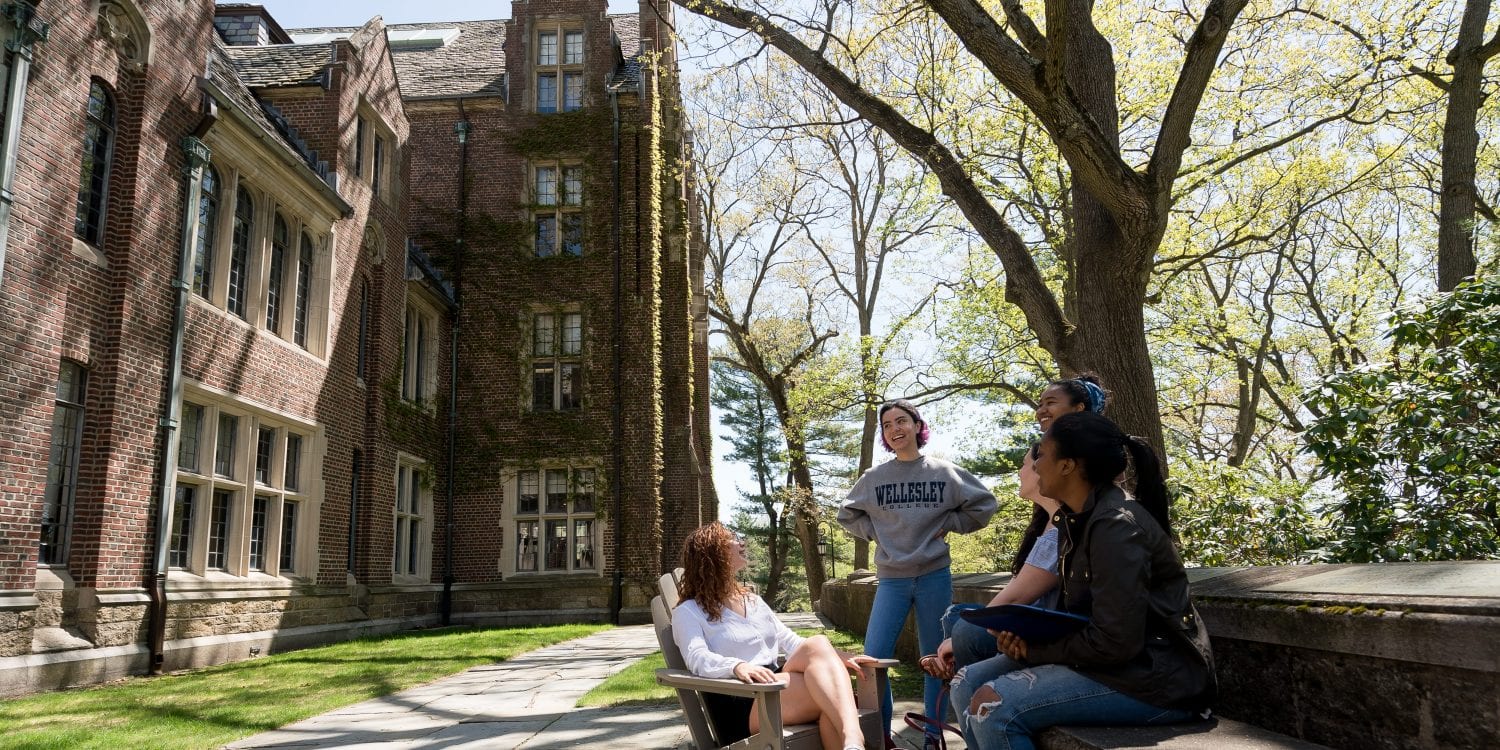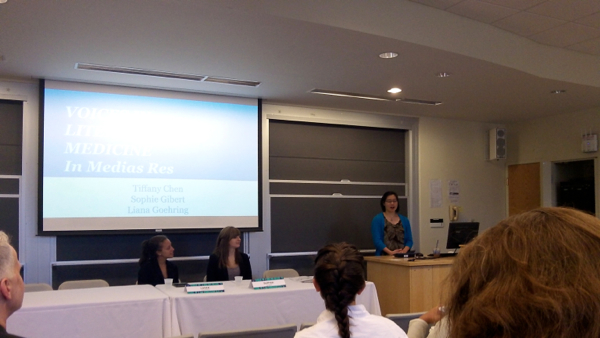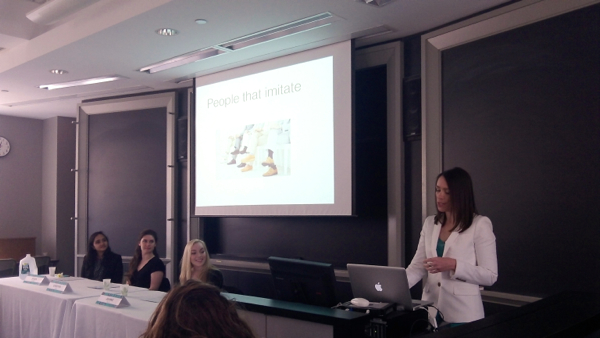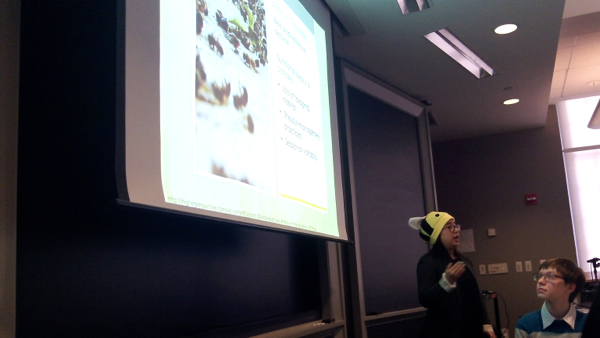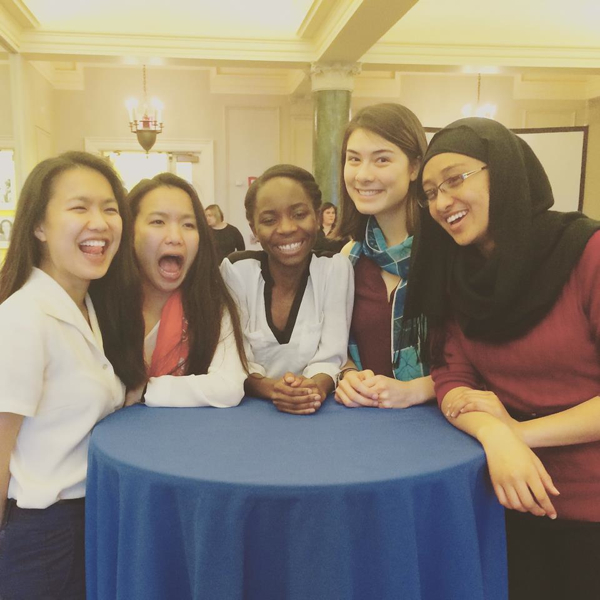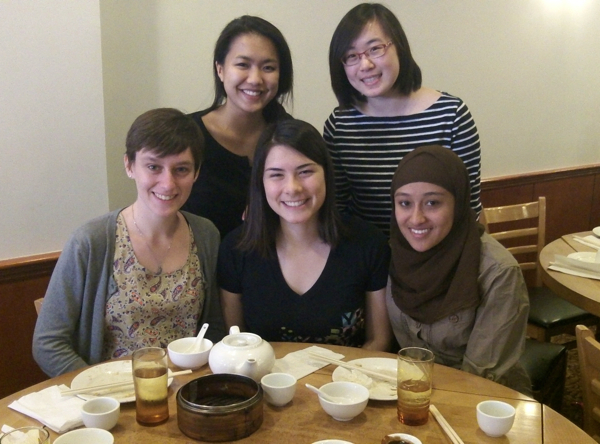Hey all :).
It has been an exciting week! I am now in the calm before my final tests, and am unbelievably relieved to have made it. Last week was chaotic for a few reasons, and there’s nothing quite like the absence of pressure to foster appreciation.
Wednesday last week was Ruhlman Conference, a day Wellesley sets asides classes in exchange for a full day’s worth of student presentations. I love Ruhlman, and have since I was a first year and was attending talks by thesising seniors who were describing projects of such depth and diversity that I couldn’t imagine how I would get there. This year, I slept in past my usual 7:42am wake-up on Wednesdays, and started out the morning listening to Tiffany talk about music therapy. There is something special about listening to a talk when you know the presenter—when you know her interests, know her activities, know her as a person and her history of coming to be who she is. As Tiffany says, she can always learn new things about me, but nothing surprises her anymore. That was my experience with Tiffany’s talk—I learned for the first time about this project that she had been working on in her Literature and Medicine class, and yet if all of the Ruhlman powerpoints had been arranged on a screen I would have had no trouble identifying hers. The passion for listening to human stories, her belief in the power of music, use of poignant quotes, her love of the intersection of medicine and music—while science talks are informative, there is nothing quite like humanities presentations, when you see so much of the person through the analysis, the words.
I attended Heather’s talk next. Heather is a Davis Scholar— students who apply to Wellesley when they are of nontraditional age. In my experience, the Davis Scholars are some of the most interesting people on campus—for example, in the fall at Let Me Speak, a performance when students present their stories to the new first years, one of the Davis Scholars told us about her past as an ice skater competing in the Olympics. I don’t know the full details for Heather’s life, but she brings her daughter Hannah around, and she used to be in the Navy. Now she works for Prof. Spelke at Harvard, doing research in cognitive psychology in infants. She gave a marvelous talk, clear, entertaining, and fluid, discussing what infants believe about imitation.
Three other presenters followed Heather (and two followed Tiffany in the morning session), and I urge you to check out the conference schedule to see the range of projects covered. At this point in the day, around noon, it was time for me to head to MIT—I’d decided to skip my morning MIT class to go to the talks, but I needed to go to office hours since I had a math test on Monday. Wellesley gives students the day off on Ruhlman, to attend the student talks, but no such luck at MIT :).
When I returned back from MIT around 4pm, after a successful set of office hours—some TAs are better than others, and Carlos, on Wednesdays, is the best—I headed straight to the room that I was presenting in. My friend Alyssa walked in soon after, as well as Jacquelyn and Anne, and we each set about loading up our 15-minute powerpoints. Presenters are grouped into “sessions,” with three or four talks between 15 and 20 minutes, and in our session Alyssa presented on mitochondrial pathways, Jacquelyn discussed biological regeneration, Anne spoke about food stress in honeybees, and I spoke about responses to color in glob cells. I was the last presenter, and it was indescribably lovely to see my group of swim team friends walk in after Anne’s talk, joining my sister, one of my lab mates, Sebiha, a first-year friend, more senior friends, Christine, her father, Tiffany’s mother, and Prof. Higgins, my first-year research advisor. As I told people later, it was a day of intense validation—I can’t really describe how important it felt with the combined power of all of the birthday wishes and the incredible support of so many people. Getting into Cambridge was a similar high—there was just so much honest happiness for me from high school friends, friends from all sorts of groups at Wellesley, acquaintances and friends at MIT, family… there is something so special in being a senior on campus, watching everything come together, knowing that you made this experience along with all of these people. Having accomplishments come to fruition, years of work, years of friendship—I remember coming to Wellesley as a first year, and distinctly thinking: all right, I’m going to have to start all over, high school doesn’t count anymore. And this is of course the opposite, but I don’t feel like I could ever say that there’s a part of these accomplishments that “don’t count anymore”—because these aren’t just academic accomplishments. These are new ways of thinking, new ways I’ve defined myself, new abilities I’ve developed, and connections between people I want to stay with for so many more years than we have had together. College will of course fade, and I and the rest of us will change, but it feels in a way much more like a—like a building, not a new beginning, that will come after.
After my presentation—I had a lovely time; preparing is the worst, but presenting is the best— I joined friends at the celebration afterwards for the presenters. I ended up chatting with people far longer than I had anticipated, and despite my professed plan of doing my pset, I ended up going to Tiffany’s room afterwards to “have wine, cheese, and watch a cancer movie! It’s going to be great!” (When she had described this party of hers to me that morning, I was practically in hysterics. “I can’t believe you’re my friend,” I informed her. She’s been reading The Emperor of All Maladies for fun, among other things, and the two other people she invited to her room were similarly enthused. While I might not be able to appreciate the specifics in this case, there is nothing better than nerds doing what they love :)). We talked for a bit afterwards, and that finished up my Wednesday :).
Thursday was spent in a kind of demoralized panic. (It was a gradual progression that started in panic and finished up quite defeatist.) I’d been working on my machine learning problem set for the past two or three weeks, but office hours had finally run out, and my program still wasn’t working. I was at a point where more time on my own wouldn’t help anything—there was some kind of bug in my program, somewhere, but I didn’t know where it was or how to find it. I was resigned to the idea that I’d just have to turn this pset in as it was, and lose all of the associated points. Of course, I’m writing this in the past tense, so you know there has to be the inevitable happy conclusion—but this was not at all inevitable. It was in fact probably the most miraculous pset recovery that I have ever experienced, and I am stunned by the grace of the people who helped me.
The pset story went somewhat like this. Monica existing in a state of anxiousness, somewhat relieved by the completion of Ruhlman, somewhat augmented by the presence of this math test on Monday, mostly caused by not doing well in my Machine Learning class and feeling a sense of helplessness and a good helping of isolation. The problem with taking classes at another school is that it’s hard to be friends with your classmates, since most of the social activities take place in the evening or in clubs. And the problem with not being friends with your classmates (besides the obvious) at a school where psets demand working with other people is also obvious. I’ve worked around this problem in the past by trying really hard to make friends, attending as many office hours as possible, and communicating as much as possible over the internet (MIT has a truly excellent forum for community psetting). One of my other Wellesley friends who takes MIT science classes has more of a knack for the work than I do, so she actually needs less time with the TAs and with peers than I do, which is another way to resolve the problem. Usually, everything works out, because I plan weeks in advance and start really, really early, maximizing the one-on-one time I have with the TAs and attending the least popular times with the best possible TAs. (You can imagine how this impacts my schedule—everyone at Wellesley chooses where to make their sacrifices. I find my time at MIT completely worth it, but I actually don’t know anyone who spends as much time there as I do.) I unfortunately unanticipated how bad the bugs would be in this case.
So, on Friday, feeling this desperation, I went and begged two classmates who I had helped a little bit in previous office hours. Katharine so incredibly kindly offered to meet with me on Saturday. Linda talked with me all day on Saturday through Facebook. I came in on Saturday on the earliest bus, sat with Katharine for more than two hours, and she just patiently worked with me on the sole talk of debugging my code. Then, by communicating with Linda, I ended up sitting there for a few more hours and more debugging my code. The problems? One case of integer division—dividing by 2 instead of 2.0, which screwed everything up significantly. Forgetting a single line of code where I set the variance to be a minimum of .25. Missing my iteration condition by an order of magnitude. Setting the mean to zero when it wasn’t being iterated through instead of to its previous value. These were all the problems. Small things. Hours. Hours upon hours that these two MIT girls sat with me, holding my hand, continuing to encourage me when I repeatedly wanted to give up. I told them both several times, “Thanks so much for your help—I think I’m just going to give it up and turn it in now.” And every single time, even though I was offering them a way out, even though they were doing this for no reason but to help me, and had been doing this for hours, they’d say “have you checked this?” or “let’s try this.” If there’s one thing about MIT students I have seen again and again, and don’t claim at all to understand, it’s the dogged persistence to never give up, and to just keep on helping until it works. I’ve never felt this way about a Wellesley pset—I’ve never felt like I’d run out of resources to fix something, either with peers or professors or my own abilities—but whenever I encounter this feeling at MIT, it’s the same story, again and again and again.
I… the generosity. It really, really stuns me. At Wellesley, I always feel supported, like there’s always people to turn for help if I need it, and most of the time I’m able to muscle through on my own. At MIT, I very frequently feel like I can’t actually complete anything on my own, but the continued generosity of TAs and the students—just their quiet and unquestioned belief that of course it’ll get figured out, of course you can do it—I can’t even express; I’m just shaking my head right now. And at Wellesley, it’s different, but the professors are always there, always holding extra office hours, always bending over backwards to offer help—there’s different communities of people giving so much of their time, different communities showing this steadfast belief in us, but it’s incredibly overwhelming and beautiful and a gift. I feel so honored to take classes at both institutions, to be able to call myself a student at both, to be here and present within such remarkable groups of people.
Speaking of. On Thursday I was happy to put aside the pset fear for the moment and attend the annual celebration for winners of fellowships and scholarships. It was held at President Bottomly’s house, and I had a wonderful time talking with acquaintances and friends both. I was there as a winner of one of the Horton-Hallowell scholarships, and Liz Mandeville, the Director of Fellowships Program at Wellesley, and MaryBeth Callery, the Assistant to the Director of Fellowship Programs, had just offered me the splendid news that they were able to offer me $3000 more than they had anticipated. … Do you know how wonderful Wellesley has been to me over my time here? Do you know how much money for research they have invested in my education, how much they have supported me? I didn’t, but I calculated it yesterday, and the amount that this institution has given me is astonishing. From Wellesley’s scientific research funds:
$14,800 for the Horton-Hallowell, in support of my graduate study.
$16,000 for the Beckman Scholarship
$650 to attend the Society for Neuroscience Conference
$4500 for the Wellesley Summer Research Program, 2013
$2000 as a Sophomore Early Research Student
$4600 for the Wellesley Summer Research Program, 2012
And I additionally tried for the Goldwater and Churchill Scholarships but was unsuccessful. That is $42,550 dollars in Wellesley research funds. $42,550 in research funds. I mentioned this to Prof. Conway, and he reminded me that this is why he is here, this is why Wellesley is such an incredible institution. Because Wellesley supports its students. I cannot even imagine.
(As a note, I would like to urge all future students to please, please apply for things. You will think you don’t have the time, and it can be a painful process, but you learn so much from it. And Wellesley is incredibly supportive, and has incredible people to help you—I definitely did not do any of this on my own—but part of the process is reaching out there and trying. It was so lucky to receive the Beckman on the second try. Every application has been arduous, improved my writing, improved my thinking, involved asking for a LOT of help, and took forever. The thing that most delighted me in going to this fellowship celebration, actually, was seeing Carina Belvin’s name as a winner of the Goldwater Scholarship. Because we’d both tried for it last year, and both earned Honorary Mention. And then she applied again this year and won it. And I’ve done really, really terrible interviews, and did a really terrible interview recently about a month ago, and had some really, really terrible email correspondences I’m still recovering from, but you get better at it. You learn from it. It’s worth it.)
And on Friday I had tea with Liz, the Director of Fellowships at Wellesley. I love Liz. She is one of the most relentlessly competent women I have ever met, and she has helped me so much in the process to apply for the Churchill Scholarship. That would have funded my year in Cambridge, literally changed the course of my life despite not getting it (since I wasn’t even considering a Masters program before this fall), and the process for applying for it changed me as a person. I usually consider myself pretty confident—when I go for things, I tend not to doubt myself along the way (which has caused rather huge problems in the recent past, but that’s another story)— but I have never doubted myself so much in applying for anything as for the Churchill Scholarship. I don’t think I’ve ever sent an email so insecure to someone in a position in authority—I really don’t think I can do this, I’m not going to get it, I think it might just be best to withdraw now— but Liz just pulled me on through, step after step after step. And there were plenty of steps in that application—that was also the longest application I’ve ever submitted, because I started late, a potential PI backed out on me abruptly and rather late in the process, I was perpetually just-barely ahead of the application deadlines, I didn’t think there was a good chance that I would get this scholarship, that semester was insane academically, there was a bit of social drama, and I was feeling pressure to decide whether I was actually going to apply to graduate school this application cycle or not (and really doubting myself on that count, even more than for the Churchill.) And yet. My parents—who always tell me never to give up—and Liz.
Liz isn’t actually a science major—she was an International Relations major when she was at Wellesley. She worked in conflict resolution in Rwanda—interviewing people under the trees, she told me—worked for the UN in some capacity for a time, and told me about all sorts of traveling that I just kind of nodded along to over my tea, amazed. She still travels a lot, she told me, because her husband was also a foreign aid worker. She has a PhD in conflict resolution that she’s been working on for years—the research she did quickly, she said, but she got burned out with the writing. And I’m just sort of blinking at her. I told her about my potential plans to travel in September, since my program in the UK doesn’t start until October. “Start in an easy country, like Thailand, Vietnam,” she told me, “easy to travel, good food, plenty of people to get help from. You can build up from there!” I have no idea what she thinks I’ll be building up to, but she just sold me on traveling alone, which I was previously really dreading. I always think I’m plenty good at pushing myself, you know? And then I meet Prof. A at the final research presentation at the end of the summer, and he tells me “You must apply for the Churchill.” And then I’m looking up the stats for this scholarship and telling my parents it’s not possible and they’re saying “Apply for the Churchill.” And then Liz is actually keeping me doing the Churchill, and Prof. Hildreth is making sure I’m actually writing this thesis and making it through Prof. Tenenbaum’s class, and Prof. Kanwisher and Hillary, her TA, are telling me to work harder on this research proposal, it needs to be better, and Liz is here telling me to go travel on my own and you know what? There is a good chance that in September I will be traveling on my own.
In the context of things, these concerns of mine are tiny. I think about what life was like in the few days I spent in Sabana Grande, Nicaragua—with Alejandra and her mother and my host sister—watching the chickens, mangling the tortilla dough as I watch her grandmother make it every morning. Even then, I don’t know what life is like there, because I was there for a tiny snippet of time. Into their world and back away again as quickly as I came, they told me in less words. But it’s my life, the pace of it, the expectations in my world, and I suppose that what matters is that my growth feels valid to myself, and will help others in the future.
Hmm, that’s what I’ve got, readers :). I had a splendid Saturday birthday celebration – out to dimsum with friends, and then watched the Age of Ultron, after—and my math test is finished. Thursday’s a big fun night for me (I’m sure you’ll see why in my and everyone else’s blog next week), and Friday’s the last day of class for Wellesley. I’m actually done the Friday after that, since my classes are all at MIT. My thesis defense on Weds, and then finals, and then senior week, and then Commencement after that. I’m going to have a college degree from Wellesley, readers. The mind boggles.
Happy spring and thanks as always for listening, best,
Monica
